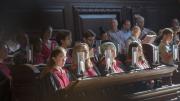President Drew Faust, who spoke at Morning Prayers last academic year about the 1965 voting-rights march in Selma and about the diversity of the Harvard community, opened the 2015 fall term by visiting Appleton Chapel on September 2 to talk about diversity again—this time in the shadow of the lawsuit now challenging Harvard’s admissions practices. Speaking soberly, she characterized the case as touching on the University’s “most fundamental values, a suit that challenges our admissions processes and our commitment to a widely diverse student body.” Harvard personnel gave depositions in the suit during the summer, and Faust said, “Our vigorous defense of our procedures and of the kind of educational experience they are intended to create will cause us to speak frequently and forcefully about the importance of diversity in the months to come.”
(The case, Students for Fair Admissions v. Harvard, is described on the website of The Project on Fair Representation, which describes itself as supporting “litigation that challenges racial and ethnic classifications and preferences in state and federal courts.” The SCOTUS blog describes the case here. The project’s president is Edward Blum, who has been a leading activist opposed to consideration of race in policymaking; The New York Times Magazine cover story, “A Dream Undone,” recently profiled Blum and other leaders behind challenges to the Voting Rights Act. Inside Higher Education provided context on the Harvard lawsuit and a related action filed against the University of North Carolina, putting them within the recent history of litigation over universities’ admission procedures, including the Supreme Court’s 2013 ruling in Fisher v. University of Texas at Austin—on which the court will hear a second round of arguments in its new session.)
Going beyond admissions per se, Faust said that “simply gathering a diverse mixture of extraordinarily talented people in one place does not in itself ensure the outcome we seek. Everyone at Harvard should feel included, not just represented, in this community.…Diversity must become belonging.”
Effecting that condition, she continued,
building a community of genuine inclusion and belonging…is not easy. There are many individuals who have arrived here this past week—and no doubt many already here—who have little understanding of the cultures, origins, and expectations of roommates, classmates, and section mates, of colleagues different from themselves. Perhaps they worry that if they reach out, they will display their ignorance; that ignorance will be perceived as insensitivity. Can we strive to educate rather than isolate and condemn? Can we together turn what we might leap to label a microaggression into teachable moments? Can we explain why phrases like “off the reservation” or words like “lynching” have a different and powerful resonance for individuals who hear them within a heritage of violence and oppression? Can we make our lives together the subject for inquiry and exploration and understanding in something of the same spirit with which we approach our academic purposes?
To that end, she exhorted the community to be “generous listeners,” a phrase from Graduate School of Education dean James Ryan. Faust concluded with a plea that members of the community “Listen hard, listen generously, risk making a mistake, risk being made uncomfortable, risk forgiveness. Learn from one another.”
(An inquiry into norms and diversity, with an historical focus, is under way at Yale, where President Peter Salovey has begun a community conversation on the naming of one of the residential colleges—in Harvard nomenclature, a House—after John C. Calhoun. The Yale Daily News reported the broader discussion about past ties to slavery in the context of contemporary news developments.)
In Cambridge on September 1, Faculty of Arts and Sciences dean Michael D. Smith, Harvard College dean Rakesh Khurana, and Faust each addressed aspects of human differences and the uses of diversity within a residential learning community during their remarks at Freshman Convocation.
President Faust’s text, as delivered:
Today, as we embark on this new academic year and as we welcome to campus individuals from a wide range of origins, backgrounds, locations, and circumstances, I would ask that we pause to recall and reaffirm our purposes and our opportunities.
I often remark that for many if not most of those arriving at Harvard for the first time, this is the most varied community in which they have ever lived—perhaps ever will live. People of different races, religions, ethnicities, nationalities, political views, gender identities, sexual orientations. We celebrate these differences as an integral part of everyone’s education—whether for a first year student in the College or an aspiring M.D. or M.B.A. or LL.M.—or for a member of the faculty or staff, who themselves are always learners, too.
As the 2015-16 academic year begins, Harvard confronts a lawsuit that touches on its most fundamental values, a suit that challenges our admissions processes and our commitment to a widely diverse student body. Our vigorous defense of our procedures and of the kind of educational experience they are intended to create will cause us to speak frequently and forcefully about the importance of diversity in the months to come.
But simply gathering a diverse mixture of extraordinarily talented people in one place does not in itself ensure the outcome we seek. Everyone at Harvard should feel included, not just represented, in this community. “I, Too, am Harvard” must be a statement every one of us can confidently make. Diversity must become belonging.
In recent years, we have been reminded we need to do more to make this so. We have also been reminded of the profound challenges of inequality and injustice in the society that surrounds us—issues that necessarily shape our lives within as well as beyond Harvard’s walls.
As we contemplate the year to come and the range of challenges before us, let us remember that building a community of genuine inclusion and belonging is a critical dimension of that work. And let us acknowledge that such work is not easy. There are many individuals who have arrived here this past week—and no doubt many already here—who have little understanding of the cultures, origins, and expectations of roommates, classmates, and section mates, of colleagues different from themselves. Perhaps they worry that if they reach out, they will display their ignorance; that ignorance will be perceived as insensitivity. Can we strive to educate rather than isolate and condemn? Can we together turn what we might leap to label a microaggression into teachable moments? Can we explain why phrases like “off the reservation” or words like “lynching” have a different and powerful resonance for individuals who hear them within a heritage of violence and oppression? Can we make our lives together the subject for inquiry and exploration and understanding in something of the same spirit with which we approach our academic purposes?
In a conversation about these issues among the deans this summer, Dean Jim Ryan of the Graduate School of Education urged that we strive to be what he called “generous listeners.” That is in my view the presupposition for real learning. The University is an institution committed to free speech—yours and everyone else’s. In the course of the year to come, that freedom is likely to produce some utterances that we deplore. And there will be times we must speak out against them. But we are likely far more often to encounter good intentions gone awry; mistakes and misunderstandings that are an inevitable part of this experiment in diversity we at Harvard are so committed to defend—in the courts, in the public discourse, and in our lives together.
Listen hard, listen generously, risk making a mistake, risk being made uncomfortable, risk forgiveness. Learn from one another.










